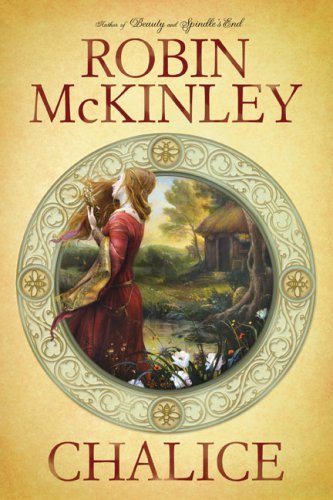Recommended Read: “Chalice” by Robin McKinley
I come to every Robin McKinley book with a lot of expectations, because I have read and re-read her books more than any other books, period. I am a genuine, bona fide Robin McKinley fan, and therefore it's sometimes difficult to read one of her new books because I'm constantly muttering under my breath, please be as good as the rest, please be as good as the rest. Luckily, Chalice certainly was as good as the rest: It is lyrical, grounded in real things, and told from the point of view of a female heroine. I swallowed it up in only a few days, and I'm looking forward to reading it again. (I have to say it's surprising to me that even these days, female heroines are hard to find in fantasy. I'm talking about the kind who save the world, not the kind who fall in love with a supernatural guy and spend thousands of pages lusting/pining after him. Anyway.)

Chalice is about a woman named Mirasol, a beekeeper, who is chosen to be the new Chalice in the Willowlands. Chalice is an office that requires Mirasol to bind the land together, sort of in a healing capacity, and also to work closely with the Master. The new Master is not exactly human, and many of the people have trouble trusting him; the novel is about the way Master and Chalice come together to save their land. Along the way, Mirasol's bees and their honey play important roles in making people whole.
What I love about Robin McKinley's books might not be something that is easily accessible to everyone, particularly those who are new to her. I love the familiarity of them. I may have never read Chalice before, but it's still Robin McKinley -- her writing voice. It might also help that I've been reading her blog for several months now, so I can hear her voice there on an almost daily basis.
Of course, over the years, McKinley's writing voice has changed. This shouldn't be surprising (why would we expect a writer to sound the same over a lifetime?), but I've found that it's sometimes difficult to evolve along with an author (or a band -- e.g., U2's music has changed, too, leaving a lot of fans disappointed and/or confused and/or missing the old days). I feel like McKinley's voice has grown stronger with each book, and Chalice continues that evolution.
She has a very distinct way of writing long sentences that form a particularly McKinley-esque rhythm. There are often several longer sentences that contain several phrases, followed by a shorter sentence that caps things off in a dramatic way. For example:
There were always smaller tasks mounting up that she never quite kept up with the way she wanted to, although she knew that was normal enough. But the day Mirasol came home from tending the ash grove which the Lady had blessed, she found that one of the big crocks in the cellar where the end of her winter's mead remained had foamed up and run over. This in itself was annoying and wasteful and had to mean that she had set it up badly and been trapped by her own incompetence, but it was also surprising. If this had happened five years ago she wouldn't have thought beyond finding out what she had done wrong. But she knew--mostly--what she was about by now. That this should happen was almost frightening. (page 65)
I also noticed the way McKinley often embeds a humorous aside within a longer passage that is otherwise quite serious. I don't think I've noticed that so clearly before, but thinking back I can remember her doing it in all her books. The humorous asides are almost always from the point of view of the main character and add a very human element to them. Plus it revealed to me that it is certainly possible to be funny in the midst of a "serious" fantasy novel. That's a good thing to know.
It's been interesting for me to read books, lately, as a writer as well as a reader. When I was in a creative nonfiction writing workshop in grad school, the teacher (Kyoko Mori) told us half-jokingly that it was important to read other writers so that we could uncover their techniques and then copy them. She didn't mean plagiarism, of course, but there's no need to reinvent the wheel. Reading Chalice, I can see how Robin McKinley has influenced me; over the years of reading her work, it's clear that I've absorbed some of her style and incorporated it into my own. (I can see where I differ from her, too, but this post is about McKinley, so I'll leave it at that.)
The funny thing is, Chalice is published by G.P. Putnam's Sons, a division of Penguin Young Readers Group. There's nothing wrong with being categorized as Young Adult, but Chalice doesn't even have any children or teens in it. So if the YA categorization puts you off (and if so, why?), just ignore it. Chalice is a thoughtful, suspenseful book about a very relatable heroine, with a lot of yummy honey in it.